Eswatini formerly known as Swaziland now officially the Kingdom of Eswatini is landlocked country in Southern Africa.
Contents
| |||||
| Decades: | |||||
|---|---|---|---|---|---|
| See also: | |||||
Events in the year 2017 in Eswatini .
Eswatini formerly known as Swaziland now officially the Kingdom of Eswatini is landlocked country in Southern Africa.
| |||||
| Decades: | |||||
|---|---|---|---|---|---|
| See also: | |||||
Events in the year 2017 in Eswatini .
in 2017, Eswatini continued to repress political dissent and failed to fulfill the human rights of its estimated 1.4 million population. The country under the absolute monarchy rule of king Mswati III, who has been its ruler since 1986 continued to violate human rights, and political parties remained banned as they have been since the year 1973. countless political and socio-economic challenges arose which drew the world's attention including the highest HIV infection rate in the world at 26 percent which was reported by the United Nations International Children's Emergency Fund (UNICEF). [1]
The country's judiciary system independence was in question as it was highly compromised and authoritarian laws continued to be used to target critics of the government and the king, even though there were basic rights guarantees in Swaziland's 2005 constitution.

Eswatini, officially the Kingdom of Eswatini and also known by its former official name Swaziland and formerly the Kingdom of Swaziland, is a landlocked country in Southern Africa. It is bordered by Mozambique to its northeast and South Africa to its north, west, south, and southeast. At no more than 200 km (120 mi) north to south and 130 km (81 mi) east to west, Eswatini is one of the smallest countries in Africa; despite this, its climate and topography are diverse, ranging from a cool and mountainous highveld to a hot and dry lowveld.

Artifacts indicating human activity dating back to the early Stone Age have been found in the Kingdom of Eswatini. The earliest known inhabitants of the region were Khoisan hunter-gatherers. Later, the population became predominantly Nguni during and after the great Bantu migrations. People speaking languages ancestral to the current Sotho and Nguni languages began settling no later than the 11th century. The country now derives its name from a later king named Mswati II. Mswati II was the greatest of the fighting kings of Eswatini, and he greatly extended the area of the country to twice its current size. The people of Eswatini largely belong to a number of clans that can be categorized as Emakhandzambili, Bemdzabu, and Emafikamuva, depending on when and how they settled in Eswatini.

Mswati III is Ngwenyama (King) of Eswatini and head of the Swazi royal family. He heads Africa’s last absolute monarchy, as he has veto power over all branches of government and is constitutionally immune from prosecution.
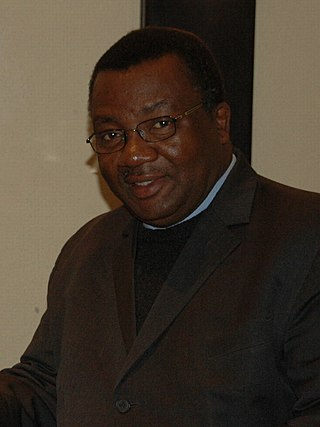
Absalom Themba Dlamini was the Prime Minister of Eswatini from November 2003 to September 2008. He is the managing director of Tibiyo Taka Ngwane.

The People's United Democratic Movement is the largest opposition party in Eswatini. It is a democratic socialist party. Formed in 1983 at the University of Eswatini, it is led by Mlungisi Makhanya.

Lobamba is a city in Eswatini, and is one of the two capitals, serving as the legislative, traditional, spiritual, seat of government of the Parliament of Eswatini, and Ludzidzini Royal Village, the residence of Queen Ntfombi, the Queen Mother.
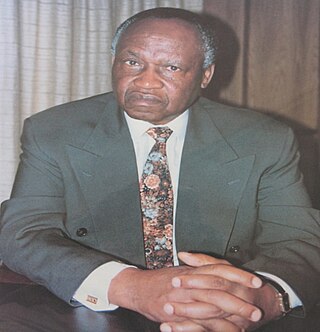
Prince Jameson Mbilini Dlamini was Prime Minister of Swaziland from 4 November 1993 to 8 May 1996. He was the grandson of King Mswati II- His father was Prince Heleba of Nkamanzi Royal Kraal.

The House of Dlamini is the royal house of the Kingdom of Eswatini. Mswati III, as king and Ngwenyama of Eswatini, is the current head of the house of Dlamini. Swazi kings up to the present day are referred to as Ingwenyama and they rule together with the Queen Mother who is called Indlovukati. The Swazi kings, like other Nguni nations, practice polygamy and thus have many wives and children.
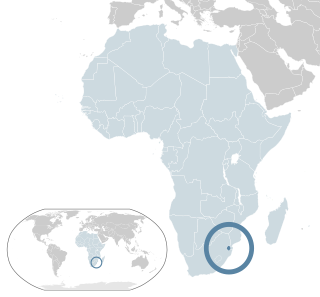
Lesbian, gay, bisexual, and transgender (LGBT) people in Eswatini have limited legal rights. According to Rock of Hope, a Swati LGBT advocacy group, "there is no legislation recognising LGBTIs or protecting the right to a non-heterosexual orientation and gender identity and as a result [LGBT people] cannot be open about their orientation or gender identity for fear of rejection and discrimination". Homosexuality is illegal in Eswatini, though this law is in practice unenforced. According to the 2021 Human Rights Practices Report from the US Department of State, "there has never been an arrest or prosecution for consensual same-sex conduct."
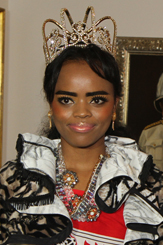
Princess Sikhanyiso Dlamini is a Swazi princess and politician. She is the eldest daughter of King Mswati III of Eswatini, and is the country's former Minister of Information and Communication Technology.
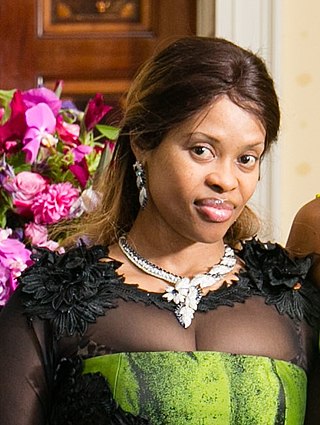
Sibonelo Mngometulu, known as Inkhosikati LaMbikiza, is the third and senior wife of King Mswati III of Eswatini. Sibonelo married Mswati III in 1986, becoming the first wife he personally chose to marry, following two ceremonious marriages. She is the mother of Princess Sikhanyiso Dlamini and Prince Lindani Dlamini.
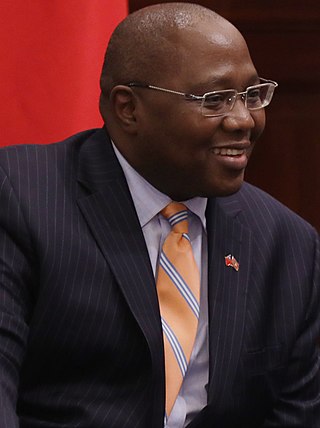
Ambrose Mandvulo Dlamini was a Swazi business executive who served as the tenth prime minister of Eswatini, holding the office from October 2018 until his death on 13 December 2020.

Government of the Kingdom of Eswatini is the union government created by the constitution of Eswatini where the monarch holds supreme executive, legislative, and judicial powers. The Ngwenyama (lion) is a hereditary leader, rules the country, with the assistance of a council of ministers and a national legislature.

The history of the Jews of Eswatini, formerly Swaziland.
Events in the year 2021 in Eswatini
A series of protests in Eswatini against the absolute monarchy and for democratisation began in late June 2021. Starting as a peaceful protest on 20 June, they escalated after 25 June into violence and looting over the weekend when the government took a hardline stance against the demonstrations and prohibited the delivery of petitions. Lower-level unrest and protests continued until summer 2023.
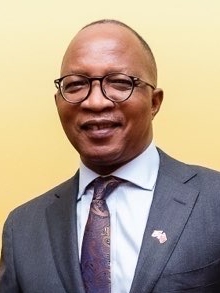
Cleopas Sipho Dlamini is a Liswati business executive who served as the prime minister of Eswatini from 2021 to 2023.
Capital punishment is a legal penalty in Eswatini, formerly known as Swaziland. Despite its legality, no executions have been carried out since 1983. Therefore, Eswatini is classified as "abolitionist in practice."